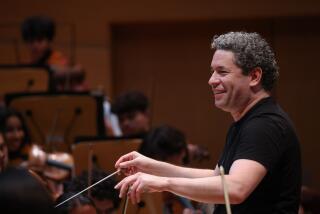Dudley Moore Seems a Friend in Need
- Share via
CERRITOS — Hasn’t everyone has had the unpleasant experience of watching a friend botch a performance so badly that the helpless onlooker feels empathetic, nerve-induced nausea?
Friday night at the Cerritos Center for the Performing Arts, this listener had the unfortunate opportunity to be reminded of such an experience, thanks to Dudley Moore, whose parts in the movies “10” and “Arthur” forever may lend him the persona of everyone’s sincere but insecure friend.
Although the evening ended with “musical parodies,” offered as encores, that demonstrated knowledge, flexibility and wit, Moore did not apply any of those qualities to his more serious undertakings. The main vehicle of his pianistic demise on this program of popular classics was Gershwin’s “Rhapsody in Blue.”
After a slick, streetwise setup by principal clarinetist Larry Hughes, Moore slopped out the work with ponderous weight, monochromatic tone quality and no apparent awareness of voicing.
Earlier, he had managed to hold his own as first pianist--with gracious and capable partnership from Rena Fruchter as second pianist--in Saint Saens’ “Carnival of the Animals.”
However, he gave most life to his role as narrator, using Ogden Nash’s jovial poems, written in 1951.
The musical highlight in “Carnival” came from first-chair cellist David Shamban, whose solo as “The Swan” impressed with its sureness, intensity and effective use of rubato.
Several orchestral players distinguished themselves with good-natured solos in this piece. Yet throughout the concert, the orchestra as a whole--an assemblage of seasoned freelancers--rarely rose above the level of a gifted high school band.
Tchaikovsky’s “Romeo and Juliet” took a severe beating by the 49-member group that included only six first and six second violins to play this large and lavish score.
Stewarded by last-minute substitute Stephen Stein, conductor-in-residence of the Houston Symphony, the instrumentalists reduced Tchaikovsky’s lush and urgent fantasy overture to a metronomic exercise.
More to Read
The biggest entertainment stories
Get our big stories about Hollywood, film, television, music, arts, culture and more right in your inbox as soon as they publish.
You may occasionally receive promotional content from the Los Angeles Times.










